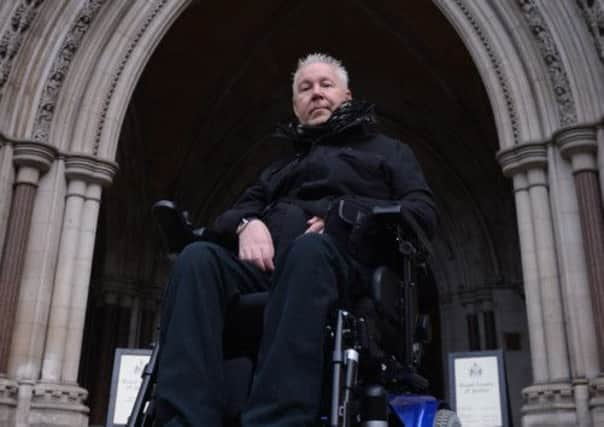Court rejects right-to-die plea of Leeds accident victim Paul Lamb


Three judges in London rejected the Nicklinson and Lamb cases, but in a majority ruling the court allowed an appeal by a locked-in syndrome sufferer known as “Martin”, who sought clarification of Director of Public Prosecution (DPP) guidance relating to the position of health professionals in assisted suicide cases.
Today’s ruling was given by the Lord Chief Justice Lord Judge, Master of the Rolls Lord Dyson and Lord Justice Elias.
Advertisement
Hide AdAdvertisement
Hide AdFather-of-two Mr Nicklinson, 58, died at home in Melksham, Wiltshire, last August, a week after he lost a High Court bid to end his life with a doctor’s help.
Mr Nicklinson, who was paralysed by a stroke while on a business trip to Athens in 2005, had refused food and contracted pneumonia after he was “devastated” by the decision of Lord Justice Toulson, Mr Justice Royce and Mrs Justice Macur.
But his widow Jane vowed to continue the battle in the courts, which she said was “part of Tony’s legacy”.
During the appeal hearing the judges heard argument that people who are too sick or disabled to end their “unbearable” lives without help are currently being condemned to “suffer in silence or make desperate attempts to kill themselves”.
Advertisement
Hide AdAdvertisement
Hide AdFormer builder and father of two Mr Lamb, 57, from Bramley, Leeds, who wants a doctor to help him die in a dignified way, had won the right to join the litigation to continue the battle started by Mr Nicklinson.
He was not present for the ruling.
Mr Lamb said: “I am absolutely gutted by the decision.
“I was hoping for a humane and dignified end. This judgment does not give me that.
“I will carry on the legal fight - this is not just about me but about many, many other people who are being denied the right to die a humane and dignified death just because the law is too scared to grapple with these issues.”
Saimo Chahal, the solicitor acting for Mrs Nicklinson and Mr Lamb, said: “It is inevitably disappointing for my clients that the court has decided against them.
Advertisement
Hide AdAdvertisement
Hide Ad“They are considering grounds of appeal to the Supreme Court. It is literally a life-and-death issue for Paul and there is no prospect of Parliament adjudicating on the issue any time soon, so there is but one option open to Paul and that is to try and persuade the courts that his concerns are real and legitimate.
“They are also shared by thousands of other people who want this issue to be resolved. It is wrong that people should be condemned to a lifetime of misery when they want to die. It is wrong that a good death should be denied to people in Paul’s situation.”
Lord Judge, in his last civil judgment before retiring in September as Lord Chief Justice, said the “law relating to assisting suicide cannot be changed by judicial decision”.
He said that “whatever the personal views of any individual judge on these delicate and sensitive subjects - and I suspect that the personal views of individual judges would be as contradictory as those held by any other group of people - the constitutional imperative is that, however subtle and impressive the arguments to the contrary may be, we cannot effect the changes or disapply the present statutory provisions, not because we are abdicating our responsibility, but precisely because we are fulfilling our proper constitutional role”.
Advertisement
Hide AdAdvertisement
Hide AdMr Lamb is immobile except for limited movement in his right hand and has been in significant pain since the 1990 tragedy.
Martin’s case was rejected at the High Court on the same day as Mr Nicklinson’s.
He suffered a massive stroke in August 2008.
He is unable to speak and virtually unable to move, describing his life as “undignified, distressing and intolerable” - and wants to be allowed a “dignified suicide”.
In Mr Lamb’s case he wants a doctor to help him die in a dignified way, preferably by a lethal injection, with his family around him in his own home.
Advertisement
Hide AdAdvertisement
Hide AdHe says he feels worn out and fed up of going through the motions of life rather than living it.
Mr Lamb was hoping to win the same declarations originally sought by Mr Nicklinson.
At the Court of Appeal hearing the judges said they were “acutely aware of the desperate situation” of those at the centre of the litigation, but emphasised that the case could not be decided on the basis of “personal sympathy”.
Lord Judge stressed that it had to be decided on the “basis of principles of law” after the court had heard argument from all sides.
Advertisement
Hide AdAdvertisement
Hide AdPaul Bowen QC, representing Mrs Nicklinson and Mr Lamb in their cases against the Ministry of Justice, told the appeal judges that the High Court had “rejected the claims because, in summary , it considered Parliament, not the courts, should be responsible for changing the law in this area”.
He said the High Court “did not decide the substantive issues at the heart of the claims” of whether the current law does “disproportionately interfere” with the appellants’ Article 8 rights, nor whether the defence of necessity is available to a doctor providing the assistance to die.